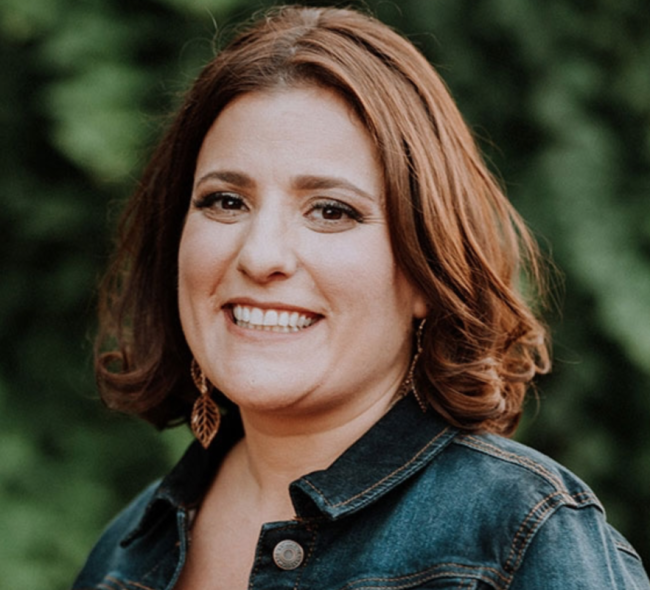You have /5 articles left.
Sign up for a free account or log in.

Sara Goldrick-Rab
Temple University
An outside law firm is looking into various issues at Temple University’s Hope Center for College, Community, and Justice, an internationally known research and advocacy group run by sociologist Sara Goldrick-Rab.
Fay Trachtenberg, a lawyer with Temple’s Office of University Counsel who focuses on employment discrimination, notified center employees of the investigation via email, directing them to comply fully with the inquiry and refrain from discussing the case or destroying or deleting any records that pertain to the Hope Center.
It’s unclear from Trachtenberg’s message what the scope of the inquiry is. But more than a dozen center employees, past and present, have in interviews with Inside Higher Ed over the past several months described toxic management under Goldrick-Rab, which they said undercut the center’s mission: promoting the idea that colleges aren’t really “student-ready” if they’re not helping ensure that students’ basic needs—such as food, affordable housing and transportation—are met.
“The center fails to live out the public values of the work being done when it comes to the treatment of staff,” said one former employee, who (like most of his former colleagues who reached out to share their experiences) wished to remain anonymous, for fear of professional or personal retribution. “The Hope Center tagline is that ‘students are humans first,’ [but] in every possible way [Goldrick-Rab] fails to apply that same lesson to the treatment of staff, viewing them as disposable to her and the work of the center.”
Letter to the Editor
A reader has submitted
a response to this article.
You can view the letter here.
Find all our Letters to the
Editor here.
Another current center employee said, “There’s drama everywhere, you know. You go to places of work and there’s bad bosses. There’s people who do shitty things. I get it. But this is just untenable.” More than two dozen colleagues have left the center in the last few years, the employee said.
Seeking Feedback
While Temple has been conducting exit interviews with employees leaving the Hope Center this academic year, and the university has received complaints from multiple center employees, Goldrick-Rab said Wednesday that she’d actually requested that Temple commission the outside investigation into her center. Goldrick-Rab said that she’s faced continued retaliation since she was publicly named in early 2021 as one of many faculty critics of Temple’s then dean of education, Gregory Anderson. Goldrick-Rab didn’t share details about the alleged retaliation, but she said it extended beyond any one individual (Anderson, who remains on Temple’s faculty, did not return a request for comment).
More central to the alleged climate at the Hope Center, Goldrick-Rab said she also asked Temple for the review because she's repeatedly asked for help managing a center that’s grown from a small start-up to a 50-person, $6 million operation since it was founded in 2018 (Goldrick-Rab moved to Temple from the University of Wisconsin at Madison in 2016).
Acknowledging a high rate of staff turnover at the Hope Center, and noting that she’s been working with a leadership coach, Goldrick-Rab said, “We want to have a productive and healthy work environment. So if people are exiting and it’s for a reason, if they’re unhappy, then I’m looking for exit interview data. Normally that’s the purpose of a feedback loop, so that it can be used for continuous improvement. We don’t receive any of that” from Temple.
Even though the center raises all its own funding and receives no direct financial support from Temple, Goldrick-Rab also said she’s concerned that not all her employees are fairly compensated, because Temple ultimately sets their salaries.
“Temple doesn’t provide regular equity reviews. I don’t have any say over compensation,” she continued. “I will ask for somebody to be compensated at X on the way in and they’ll be compensated Y.”
Even beyond compensation, Goldrick-Rab said that her employees—like others elsewhere—are increasingly interested in more workplace flexibility, as well as training and retreats, and that she needs guidance from Temple on these issues. For instance, she said that she planned a “wellness week” last August, with limited to no work, which Temple pressured her to cancel at the last minute on the grounds that it wasn’t something that could be offered to other university employees, and then the university admonished her for proceeding with the plan anyway.
Temple previously declined comment on any investigation into the Hope Center, calling it a private personnel issue.
Climate, Climate, Climate
Some former and current center employees interviewed for this story did express concerns about compensation. But most complaints centered on management and workload issues within the Hope Center.
One former employee shared the information she shared with Temple human resources personnel in her recent exit interview, including that, “People are beyond exhausted, drained and not being heard. It is our fault that the work isn’t getting done. Not that we have 10 to 16 hours of work to do and it’s not getting done. [Goldrick-Rab] promises funders and partners projects or deliverables, ignoring our lack of bandwidth or capacity to do so, which we have voiced.”
The former employee also told Temple that an “everything is a priority culture” led to her being “run into the ground.” She said she regularly missed dinner to avoid being chastised for not immediately seeing messages that often popped up across a series of business chat platforms until well into the night.
Numerous other employees described being subject to unclear or shifting personnel policy issues, such as those regarding vacation time or sick leave (some employees reported being told to take vacation days for serious medical issues).
Another former employee who said she could not bear to stay for three years, despite that being the threshold for being vested in a Temple retirement plan, said, “It was definitely ‘Hit the ground running’ and just basically a roller coaster from day one to the day I left.”
Funding Questions
Multiple employees, past and present, also expressed concern that Goldrick-Rab misled funders about what their grants included and who would be working on them. One concern that came up repeatedly was that center staff members were directed to write grants and do other work for Goldrick-Rab’s 501(c)(3) nonprofit organization, Believe in Students, which began as a way to offer small direct grants to students to help them make ends meet. The allegation here is not that Goldrick-Rab used grantors’ money for anything but the shared, student-first mission of the two organizations. Rather, it’s that Goldrick-Rab was asking center employees to do work for two organizations, contributing to the center’s excessive workload, and that the nonprofit was in a sense sheltering money that would have otherwise been collected by Temple in the form of indirect cost recovery.
Another former Hope Center employee said of Goldrick-Rab, “She hated working within Temple’s internal systems and actively sought out ways to bypass them. She would direct staff at the Hope Center to write grants on behalf of Believe in Students, even though we were not employed by them or obligated to do so. Because the center is 100 percent grant funded, we should not be using any of our time to write grants for another organization.”
The source said that Goldrick-Rab “even tried to justify these activities by claiming Temple’s chief compliance officer signed off on the relationship and saw nothing wrong with the arrangement. She didn’t care that what she was doing was wrong as long as she wasn’t getting caught. She tried to deceive a lot of people.”
Asked about this, including a specific Conagra Brands grant for Believe in Students that included the names of Hope Center employees as project participants, Goldrick-Rab said all of this was aboveboard and that similar cost-sharing agreements existed elsewhere in academe.
“We have a [memorandum of understanding],” she said. “And we do share funds. And it’s completely approved by Temple.”
Goldrick-Rab, who was away from her office this week, did not immediately share the MOU. A center employee said she was aware of plans to draft such an MOU, but she could not locate the document and did not know if it existed.
Other Concerns
Sources reported a series of other concerns, including that Goldrick-Rab had badmouthed them to outside colleagues after they’d quit the Hope Center, which they viewed as retaliation; that they’d felt pressured to take her son suit shopping and teach him how to ice-skate when she asked them to do so; and that she shared private details about some center staff members’ personal histories in professional settings, without their permission, in order to show that the center employed those who had once struggled like the students the center now supports.
Asked about these and other allegations, Goldrick-Rab expressed surprise, saying that it was the first time she’d heard some of them.
“I’m a little confused. But we’re a family-friendly place,” she said, later reiterating her request that Temple help her better manage the center, starting with access to exit interview data.
It’s undeniable that Goldrick-Rab has influenced important conversations and policy changes, to the benefit of students. But in so doing, she’s apparently alienated numerous employees who were, to start, ideological allies. And some of those employees said that funders need to know what’s happening within the center. Goldrick-Rab has also said that donors have an interest in climate issues. Earlier this year, she wrote on Twitter that “Instead of asking prospective grantees to fill out a chart of the race/ethnicity of staff, management, and boards, what if funders did the following: (1) Ask how your team aligns with the people it aims to serve and what your growth plan looks like (2) Ask for data on hiring patterns and turnover patterns by gender and race (focus on whether there are a lot of undesirable voluntary departures) (3) Ask for data on pay equity- what’s the ratio of pay at the top to pay at the bottom? (4) Ask for specifics on how staff are reviewed and evaluated for promotions.”
A current employee mocked the notion that Goldrick-Rab had requested the Temple review or that she was unaware of just how unhappy staff members were or why. The employee noted that Hope Center staff members had been required to participate in a late-2020 workplace culture study run by the consultancy Just Strategies, and that employees had been very direct about their concerns in focus group sessions with consultants (the review was centered on diversity, equity and inclusion issues but promised an assessment of the general “Hope culture”.)
The new outside review will be conducted by Leslie Mariotti, of Pietragallo Gordon Alfano Bosick & Raspanti.
Earlier this week, Goldrick-Rab sent a video to Hope Center staff members saying that she’d asked Temple for help in the form of “training, support, capacity building and trust,” but that “most institutions of higher education and the structures in which they operate bring legal action, not support, so I don’t know what they’re going to bring, but I want you to know that I am committed to ensuring that you get it.”





